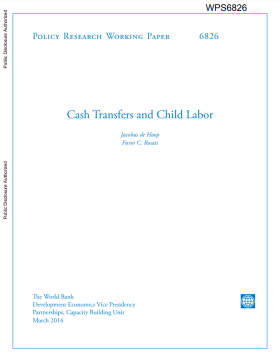Cash Transfers and Child Labor
Cash transfer programs are widely used in settings where child labor is prevalent. Although many of these programs are explicitly implemented to improve children’s welfare, in theory their impact on child labor is undetermined. This paper systematically reviews the empirical evidence on the impact of cash transfers, conditional and unconditional, on child labor. The authors find no evidence that cash transfer interventions increase child labor in practice. On the contrary, there is broad evidence that conditional and unconditional cash transfers lower both children’s participation in child labor and hours worked and cushion the effect of economic shocks that may lead households to use child labor as a coping strategy. Boys experience particularly strong decreases in economic activities, girls in household chores. The findings underline the usefulness of cash transfers as a relatively safe policy instrument to improve child welfare, but also point to knowledge gaps, for instance regarding the interplay between cash transfers and other interventions, that should be addressed in future evaluations to provide detailed policy advice.



